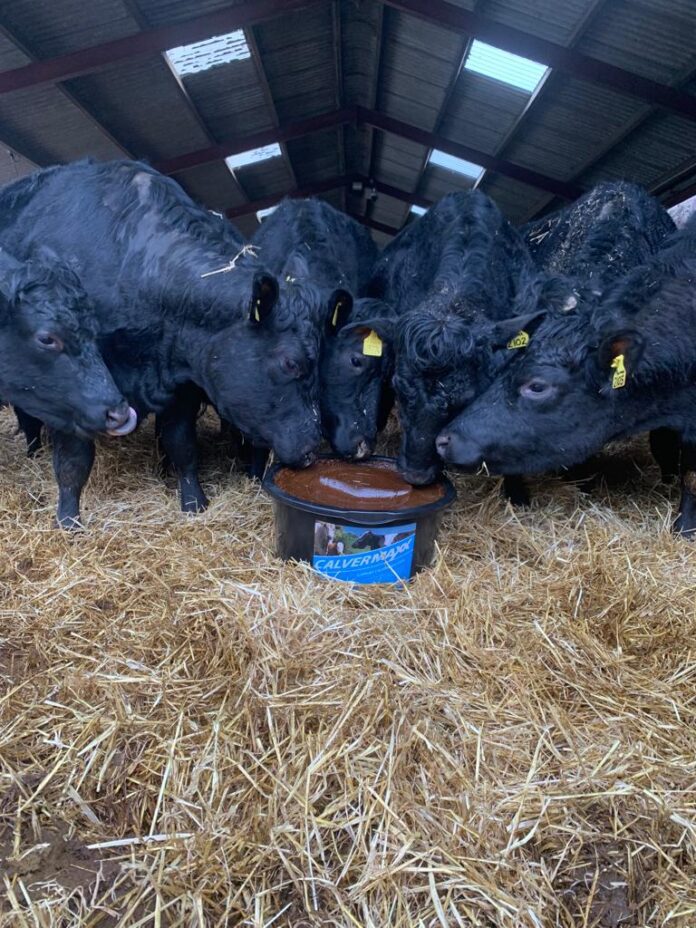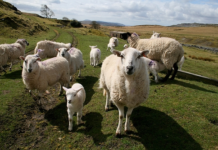

Micro and macro nutrient levels in the dry period have a direct impact on calving and post-partum performance in dairy and suckler herds
Beef and dairy producers prioritising key macro and micronutrients in the weeks leading up to calving will benefit in both the calving and post-calving period, says Dr Alison Bond, nutritionist for Rumenco.
“Minerals such as iodine, copper, selenium and magnesium are essential for normal physiological functioning and are required in increased amounts for optimal growth, immunity and fertility,” explains Dr Bond.
CalverMaxx, Rumenco’s newest addition to the Maxx range of products, has been specially formulated for the period on the approach to calving and includes high levels of essential minerals, vitamins and trace elements to optimise cow and calf performance during this period.
“Delivering a complete range of minerals, vitamins and trace elements, CalverMaxx is a palatable, high-sugar product that provides a readily available source of energy to support calf development, colostrum production and future cow fertility,” says Dr Bond.
Below, she outlines four key elements found in CalverMaxx and the role they play at calving.
- Magnesium
Required for all major metabolic pathways including muscle contraction, nerve signalling and bone formation, magnesium is the most important macromineral for pre-calving cows and heifers. At 8% magnesium, CalverMaxx helps meet requirement on the approach to calving.
“Supplementation for both spring and autumn calvers is essential because of the low levels of magnesium in the grass during those times, while also supporting muscle contraction for the calving process,” explains Dr Bond. “Furthermore, cattle do not store magnesium well in the body and therefore supplementation needs to be provided daily, meaning a free-access supplement such as CalverMaxx is ideal.”
When fed at higher inclusion rates, magnesium on the approach to calving also aides in the mobilisation mechanisms of calcium reserves. This is an important process to help prevent milk fever in the period immediately post-calving.
- Selenium
Selenium is transferred readily across the placenta and therefore feeding good levels to the cow on the approach to calving will ensure the calf also has good levels at birth. Selenium plays an important role in triggering the breakdown of brown adipose tissue in the newborn calf therefore supporting calf vigour, ensuring they stand and suckle quickly and helping to prevent hypothermia. Through its role as an antioxidant, selenium is therefore important for the immune response helping to reduce inflammation and enhance immunity.
CalverMaxx contains dual selenium sources and is paired with a good level of vitamin E at 3,000 IU/kg. At a minimum, pre-calving mineral supplements should contain at least 2,000 IU/kg of vitamin E.
“Selenium and vitamin E work in conjunction as natural antioxidants, protecting tissues from oxidative stress and the breakdown of cell membranes,” says Dr Bond.
“The antioxidant actions of selenium and vitamin E are important for the immune response, particularly white blood cell function, and therefore help to reduce inflammation and maintain disease resistance throughout the periparturient period.”
- Iodine
To synthesise thyroid hormones for control of energy metabolism and metabolic rate, pre-calving cows require iodine. With an inclusion of 300 mg/kg, CalverMaxx delivers high levels of iodine, which is especially important for cattle consuming brassicas and legumes. Compounds in these forages block utilisation of dietary iodine, requiring higher levels of supplementation.
“Regardless of diet, all pre-calving cattle require iodine supplementation since it is not stored in the body. Therefore, a continuous supply from the diet is required for the normal production of the thyroid hormones,” says Dr Bond.
- Copper
A recent survey found 50% of UK grazing beef cattle to be deficient in copper, leaving them vulnerable to poor growth rates, infertility and low immunity.
“Especially in the final three weeks before calving, we see copper requirements increase significantly. This trace element is essential for multiple different enzyme systems in the body including those involved in energy metabolism, connective tissue development and antioxidant systems,” explains Dr Bond.
Copper is also a major contributor to the development of uterine tissue, with deficiency leading to a delay return to oestrus and reduce conception rates, subsequently extending the calving interval and reducing herd profitability.
CalverMaxx contains 1,200 mg/kg of copper from varying sources, including protected copper. Copper can be locked up by the body and unavailable for utilsation when primarily forage diets contain high levels of molybdenum, iron and sulphur. Having multiple copper sources helps mitigate lock up issues and improve the availability of copper in the digestive tract for the cow to absorb and utilise.
Importance of pre-calving nutrition
According to Dr Bond, the pre-calving period can be considered the most critical period in a cow’s production cycle.
“Nutrient requirements are high in the run-up to calving, with most herds requiring supplementation of essential macro and micronutrients,” she concludes. “A multi-purpose product like CalverMaxx will deliver key performance minerals at good levels to optimise both cow and calf performance.”
Help keep news FREE for our readers
Supporting your local community newspaper/online news outlet is crucial now more than ever. If you believe in independent journalism, then consider making a valuable contribution by making a one-time or monthly donation. We operate in rural areas where providing unbiased news can be challenging. Read More About Supporting The West Wales Chronicle























